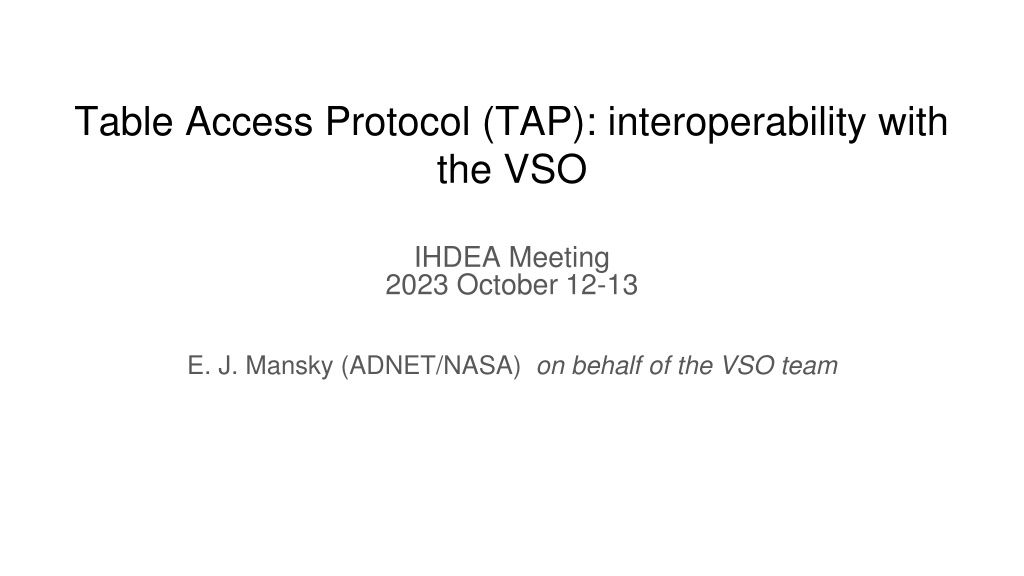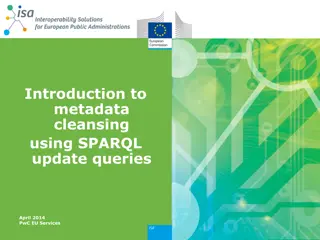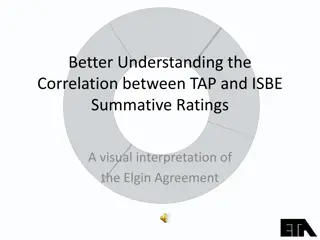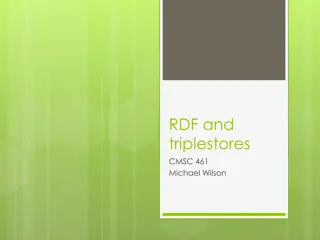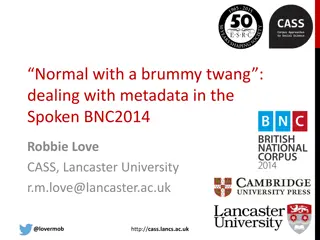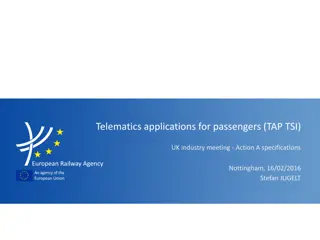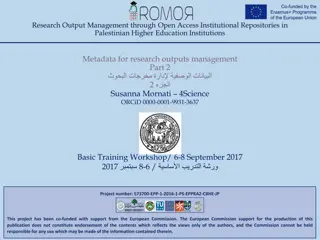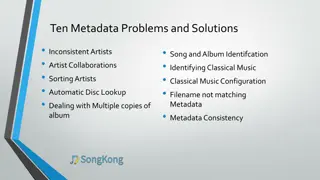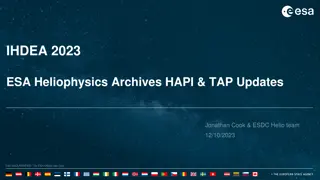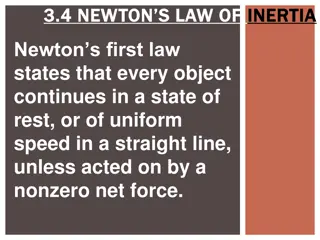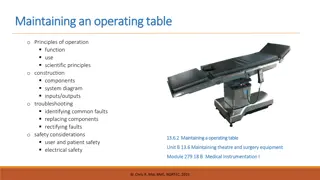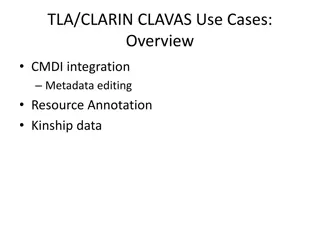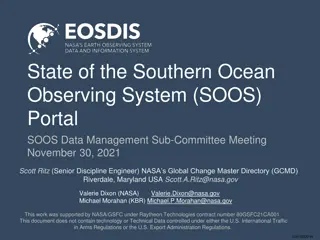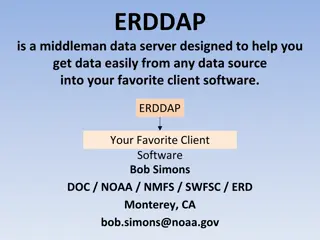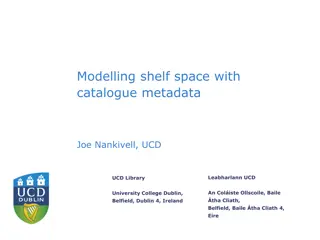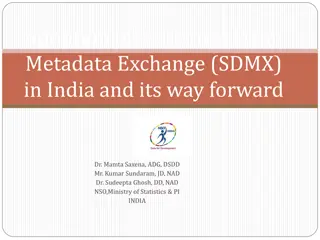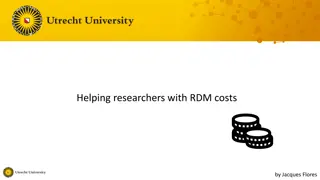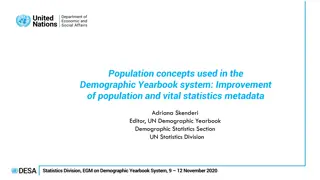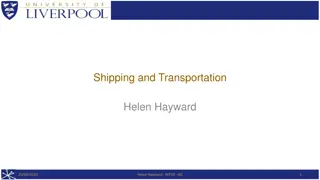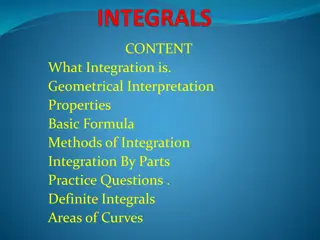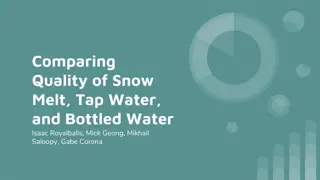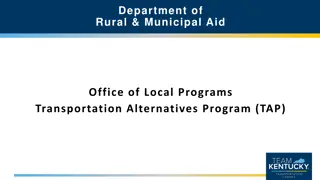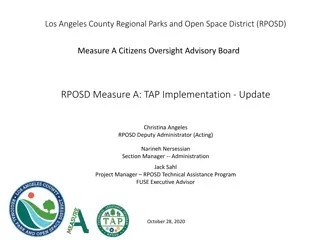Integration of REST/TAP Services into VSO Metadata DB Table
Current status of REST/TAP code implementation in the VSO along with the integration details of REST/TAP services into the VSO metadata DB table. The post discusses the interoperability with VSO IHDEA meeting, production status, available services, and the Apache session ID for distinguishing queries. The MariaDB structure and count of sessions are also highlighted in the content.
Download Presentation

Please find below an Image/Link to download the presentation.
The content on the website is provided AS IS for your information and personal use only. It may not be sold, licensed, or shared on other websites without obtaining consent from the author. Download presentation by click this link. If you encounter any issues during the download, it is possible that the publisher has removed the file from their server.
E N D
Presentation Transcript
Table Access Protocol (TAP): interoperability with the VSO IHDEA Meeting 2023 October 12-13 E. J. Mansky (ADNET/NASA) on behalf of the VSO team
Current Status: REST/TAP code in the VSO has been in production since April 2023 https://vso.nascom.nasa.gov/cgi-bin/search or: https://sdac.virtualsolar.org/cgi/search PROBA2 data searchable under Provider ESA and Source PROBA2 SOAR data searchable under Provider ESA and Source SOAR (testing) available via all 3 VSO clients (web, IDL/SSW and SunPy)
Integration of REST/TAP services into the VSO: VSO Metadata DB table services: MariaDB [VSO]> select * from services; +----------+--------+---------+-------------+----------+--------------+------------+--------------+--------------------------------+----------+--------------------+---------------+ | PROVIDER | SOURCE | DP_TYPE | DP_BASEPATH | SRV_TYPE | SRV_LOCATION | SRV_PREFIX | SRV_PROTOCOL | SRV_URL +----------+--------+---------+-------------+----------+--------------+------------+--------------+--------------------------------+----------+--------------------+---------------+ | SDAC | EUNIS2 | Python | NULL | REST | remote | eunis2 | ESA | PROBA2 | TAP | NULL | TAP | remote | tap | SDAC | PSP | Python | NULL | REST | remote | psp | SDAC | SO2 | Python | NULL | REST | remote | so2 +----------+--------+---------+-------------+----------+--------------+------------+--------------+--------------------------------+----------+--------------------+---------------+ 6 rows in set (0.00 sec) | SRV_PORT | SRV_METHODS | SRV_MECHANISM | | http | 127.0.0.1 | 5002 | Query:GetData:Ping. | JSON | | http | p2sa.esac.esa.int/p2sa-sl-tap/ | 80 | Query:GetData:Ping | http | 127.0.0.1 | 5003 | Query:GetData:Ping | http | 127.0.0.1 | 5004 | Query:GetData:Ping. | JSON | | NULL | | JSON | Store URL data for REST/TAP services in new DB metadata tables Construct the full URL from the DB data for the specified REST/TAP Data Provider Pass the needed URL to the appropriate Perl thread for processing Build and send the HTTP request to the specified REST/TAP Data Provider in the query Receive and process the response from the REST/TAP service
Apache sessionID Needed to distinguish different REST/TAP queries from one another in the backend Perl code MariaDB [vso]> show columns from sessions; +-----------+----------+------+-----+---------+-------+ | Field | Type | Null. | Key | Default | Extra | +-----------+----------+------+-----+---------+-------+ | ID | char(16) | NO | PRI | | LENGTH | int(11) | YES | NULL | A_SESSION | text | YES | NULL +-----------+----------+------+-----+---------+-------+ 3 rows in set (0.000 sec) MariaDB [vso]> select count(*) from sessions; +----------+ | count(*) | +----------+ | 182 | +----------+ 1 row in set (0.000 sec)
TAP Query code # TAP branch elsif ( $srv_type eq 'TAP') { my $tstart my $tend = $block->{'time'}{'end }; = $block->{'time'}{'start'}; my $adql_query = "SELECT+\*+FROM+v_observation+WHERE+((instrument_name=\ . uc($block- >{'instrument'})."\'))+AND+begin_date>\'".$dt_start."\'+AND+end_date<=\'".$dt_end."\ ; my $tap_query = "REQUEST=doQuery&LANG=ADQL&FORMAT=json&QUERY=$adql_query"; my $uri = $srv . '/sync?' . $tap_query; my $request = $srv_mech && $srv_mech eq 'JSON' ? HTTP::Request::JSON->new(POST => $srv . '/sync') : HTTP::Request->new('POST', $uri, new HTTP::Headers); $request->json_content( { "REQUEST" => "doQuery", "LANG" => "ADQL", "FORMAT" => "\"" . lc($srv_mech) . "\"", "QUERY" => $adql_query, "PAGE" => 1, "PAGE_SIZE" => 50000, }) if $srv_mech && $srv_mech eq 'JSON'; my $ua my $response = $ua->request($request); = LWP::UserAgent->new; .
Construction of the Hash my (@tap_fieldnames, @tap_fieldtypes); foreach my $tap (@{$tap_metadata}) { push @tap_fieldnames, $tap->{'name'}; push @tap_fieldtypes, $tap->{'datatype'}; } my $vso_tap_data = []; foreach my $tdata (@tap_data) { my $esa_data; my $tap = each_array(@tap_fieldnames, @$tdata); # combine elements of arrays tap_fieldnames and tdata pairwise into an array iterator tap then hence into a hash eas_data while (my ($field, $value) = $tap->() ) { $esa_data->{$field} = $value; } $esa_data->{'file_path'} =~ s/\\//g; # strip backslashes from pathname $esa_data->{'science_object_name'} =~ s/\\//; # strip backslashes from science object name my $wavemin = Math::BigFloat->new($esa_data->{'wavelength_range'}); my $wavemax = Math::BigFloat->new($esa_data->{'wavelength_range'}); my $vso_data = { 'provider' => $p->{'provider'}, 'source' => $esa_data->{'observatory_name'}, 'instrument' => $esa_data->{'instrument_name'}, 'physobs' => lc($esa_data->{'observation_type'}), 'size' => $esa_data->{'file_size'}, 'fileid' => $esa_data->{'file_path'} . '/' . $esa_data->{'file_name'}, 'time' => { 'start' => $esa_data->{'begin_date'}, 'end' => $esa_data->{'end_date'}, }, 'wave' => { 'wavemin' => $wavemin, 'wavemax' => $wavemax, 'wavetype' => 'euv', 'waveunit' => 'Angstrom', }, 'extent' => { 'type' => uc($esa_data->{'science_object_name'}) }, 'info' => { 'required' => $asession }, };
TAP GetData code elsif ($srv_type eq 'TAP ) { if ($srv_loc eq 'remote') { my $uri = $srv . "/GetData?provider=$provider&source=$source&method=$method->[0]&sc_id=$sc_id&data=$fdata"; my $http_request = $srv_mech && $srv_mech eq 'JSON' ? HTTP::Request::JSON->new(POST => $srv . "/GetData") : HTTP::Request->new('POST', $uri, new HTTP::Headers); $http_request->json_content( { provider => $provider, source => $source, sc_id => $sc_id, method => $method->[0], data => $fdata }) if $srv_mech && $srv_mech eq 'JSON'; my $ua my $fdata; my $tapdata = { method => [ $method->[0] ], info => { 'no_invalid_records' => 0, 'no_records_requested => scalar(@{$request->{'files'}{$rprovider}}), 'no_records_returned => scalar(@{$request->{'files'}{$rprovider}}), }, data => $self->_constructTAP_URLs($method->[0], $srv_proto, $srv_url, \@{$request->{'files'}{$rprovider}}), }; = LWP::UserAgent->new;
Construction of the TAP GetData URLs foreach my $file (@{$files}) { if ($file =~ m/\/(\w+\.fits)$/) { my $filename = $1; if ($filename =~ m/^(\w{1,4})_/) { my $instrument = $1; $instruments->{$instrument}++; push @{$tap_filenames->{$instrument}}, '\'' . $filename . '\''; if ($getdata_method eq 'URL-FILE ) { my $tap_product_query = $srv_proto . '://' . $srv_url . "data?retrieval_type=PRODUCT&QUERY=SELECT+file_path,+file_name+FROM+p2sa.v_" . $instrument . "_observation+WHERE+file_name+=\'$filename\ ; $tap_product_query = [ $tap_product_query ]; push @{$tapURLs}, { 'provider' => $provider, 'url' => $tap_product_query, 'fileid' => \@{$tap_product_query} }; } }
TAP GetData for IDL/SSW & SunPy clients my $pre = "\<!\[CDATA\["; my $post = "\]\]\>"; . 'url' => $email ? $pre . $tap_product_query . $post : $tap_product_query, SunPy client IDL/SSW client
